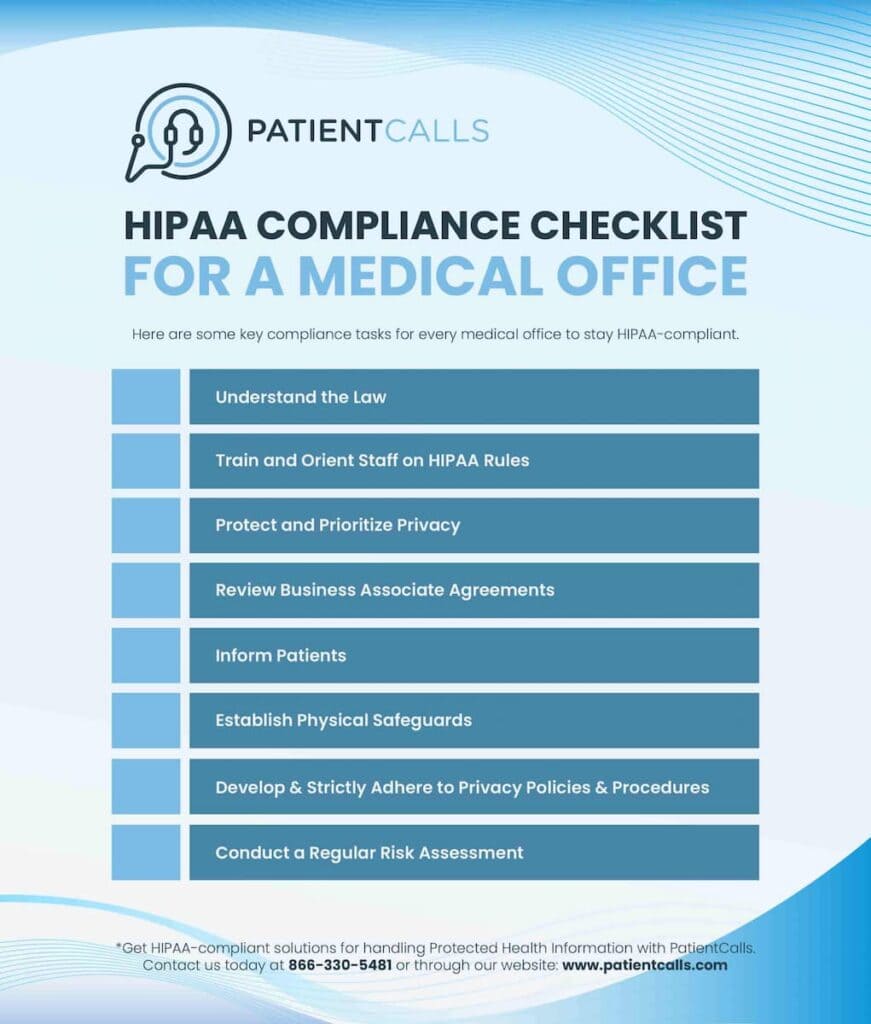Medical offices are quite prone to HIPAA violations. Because a medical office is smaller than a hospital, medical records are more accessible. While this is efficient for healthcare workers, it might be easier for ill-intentioned individuals to breach security measures.
Compliance with patient health information privacy rules, particularly the HIPAA Rule, is a must for all medical offices. This can be done in simple and comprehensive ways, which must be consistently applied throughout operations.
In this article, we discuss some key ways a medical office can comply with HIPAA rules.
Key Takeaways
1. HIPAA compliance in a medical office is critical for protecting patient’s medical records.
2. Medical offices can achieve consistent HIPAA compliance by understanding the law, conducting risk assessments, and establishing security protocols.
3. PatientCalls can help medical offices improve efficiency with HIPAA-compliant medical answering services.
How to Be HIPAA-Compliant in a Medical Office?
Compliance with HIPAA regulations combines different steps that involve understanding the law and establishing appropriate security measures. The HIPAA Privacy Rule was designed to protect patient health information from exploitation and unwanted threats in any covered entity.
Healthcare-related businesses must comply, including those offering health plans, clearinghouses, and healthcare-providing institutions.
All healthcare professionals must treat all sensitive patient records as confidential and, therefore, adhere to strict privacy rules. To do this, an organization must have clear policies on protecting patient information based on a risk assessment they conducted.

What Are the Rules to Follow for HIPAA Compliance?
The HIPAA Rule is a comprehensive legislation that was built to regulate healthcare operations and secure the safety of patient health information. Generally, the rules of the law state the following:
- Sensitive information can only be accessed by authorized parties.
- Patients are allowed to access copies of their records upon request.
- Covered entities must have proper physical, administrative, and technical security measures in place.
- All covered entities must have a clear way of reporting and resolving any breach of security.
These summary points of the HIPAA privacy rule are simplified. There is more to the law and the requirements that every healthcare entity must adhere to.
Healthcare entities are expected to know the major and minor rules stated in the HIPAA rule. In addition, they must follow every rule to avoid sanctions or any legal repercussions.
HIPAA Compliance Checklist for a Medical Office
So, what are the most effective ways for a medical office to stay HIPAA-compliant as they operate? There are many things to remember, and every employee of a medical must follow these rules at all times.
Here are some key compliance tasks for every medical office to stay HIPAA-compliant.

Understand the Law
The very first step to compliance is to know about the law. Familiarize yourself with the regulations, especially with the major rules and sanctions. The HIPAA rule revolves around three major rules that summarize the major requirements of the law.
- Privacy Rule
- The Privacy Rule highlights the need to protect individually identifiable health information by limiting access and laying out conditions. It also states the patient’s capability to access their records. To support these rules, the Privacy Rule outlines which organizations are bound by HIPAA, which organizations can use medical information, and protocols for using and disclosing patient information.
- Security Rule
- The HIPAA Security Rule focuses on securing electronic copies of patient health information. The rule requires health organizations to have the correct security measures to prevent unwanted breaches. The Security Rule also requires organizations to conduct risk assessments to identify potential threats.
- Breach Notification Rule
- Under this rule, organizations must conduct a thorough risk assessment in case of a breach to determine its potential impact on patients. The assessment must yield critical information, such as the breach’s source and the damage it has caused. Under the rule, all affected patients must be individually notified. Notifications must also be sent to the media and the Secretary of Health.
Train and Orient Staff on HIPAA Rules
All organizations must provide comprehensive HIPAA training and refresher courses for all their employees. This will help employees to fully understand the law, be guided in case of changes, and know how to apply technical safeguards.
Make HIPAA training an ongoing part of staff development to reinforce awareness and compliance. All training programs must be properly documented and acknowledged by employees.
Protect and Prioritize Privacy
All procedures performed in a healthcare facility must be geared toward protecting patient information. Basic tasks such as discussing health status with patients or calling for their turn must be done securely to protect their information.
Healthcare providers must also be very vigilant when handling patient information. No documents must be exposed and unattended, nor must they be discussed outside the hospital’s premises. Employees must follow HIPAA guidelines for reception areas.
In addition to security protocols, healthcare organizations must promote a culture of privacy and accountability for every patient’s sake.
Review Business Associate Agreements
Ensure that business associate agreements (BAAs) are in place with all vendors or contractors who handle PHI on behalf of your medical office. BAAs have a certain level of access to medical records, which makes transactions with them an open risk to potential threats.
As such, business associates and your medical office must agree on the necessary security protocols to preserve privacy and security. Policies must be written according to the HIPAA Rules.
Inform Patients
Compliance with HIPAA regulations goes both ways. This means that patients must also be involved in the process.
To do this, deliberately inform patients of the laws that protect their information through printed visual aids and including disclaimers on your website.
Notice of privacy practices must always be visible to ensure that patients are well-informed. In a detailed form, you can mention how your organization protects patient information.
This can help patients and employees avoid unintentionally disclosing protected health information.
Establish Physical Safeguards
Maintain a comprehensive set of physical safeguards that will protect patient information. Equip all areas where information flows or gets stored with surveillance cameras.
In addition, lock systems containing patient information should be installed in drawers and rooms. Provide clearance or authorization only to a handful of staff to limit room access.
Invest in strong protective systems for your computers that contain electronic protected health information. Encrypt files or utilize advanced security applications that restrict non-essential access to files.
Develop and Strictly Adhere to Privacy Policies and Procedures
Create comprehensive privacy policies and procedures that address all aspects of HIPAA compliance, including data access, disclosure, security incident response, and employee conduct. Policies and procedures must be made according to the HIPAA rules and the risk assessment made.
HIPAA compliance in medical offices must also include the adjacent sanctions for HIPAA violations. This document will help motivate healthcare providers to be more accountable.
Ensure that all employees know the privacy policies and procedures through an orientation.
All privacy policies must be accessible to staff. In addition, they must be regularly revisited to ensure they are up to date in case of HIPAA revisions.
Conduct a Regular Risk Assessment
According to HIPAA Rules, healthcare institutions must conduct a mandatory risk assessment. This task is required to identify any potential threats and system vulnerabilities that can put protected health information at risk.
Assess electronic and physical PHI risks, including cybersecurity threats, unauthorized access, and natural disasters. You can perform this task internally or with the help of a HIPAA compliance expert.
Findings from a risk assessment must always be prioritized and addressed. Use the results to build company policies for handling protected health information.

Get HIPAA-Compliant Solutions For Handling Protected Health Information with PatientCalls
HIPAA violations can stem from negligence or the lack of proper security rules. Working with other organizations, although efficient, to handle protected health information significantly increases this risk.
Minimize such risks while improving your operational efficiency by working with PatientCalls. Our medical answering operations at PatientCalls are fully HIPAA-compliant. This ensures that our expert customer service representatives handle information confidentially and according to HIPAA rules.
Improve your medical offices’ customer reception by allowing PatientCalls to integrate operations with yours. Get an advanced solution to improve handling appointment scheduling, payment processing, insurance claiming, and other administrative tasks.
Contact PatientCalls today and allow us to walk you through how we can help you protect patient health information.







